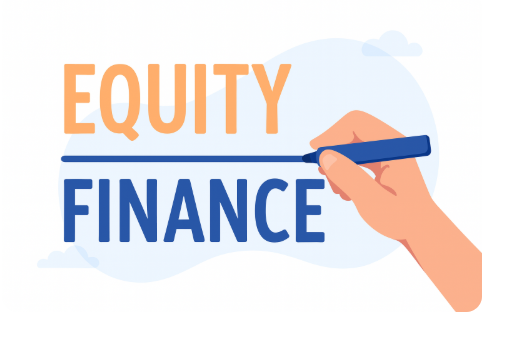As businesses evolve, the need for strategic funding becomes increasingly important. While debt financing offers one route, equity finance opens another by inviting investors to share in the business’s growth in return for capital. By selling shares in the company, business owners gain access not only to financial resources but also to the strategic guidance, connections, and expertise that investors can offer.
Equity finance is often linked with tech and innovative ventures, but its benefits stretch across sectors and business stages. This guide will walk you through the different equity financing options, helping you decide which approach aligns with your company’s size, structure, and ambitions.

Equity Investment for Scaling Businesses
Equity financing is a way to secure capital in exchange for partial ownership in your company. Rather than repaying a loan, you grant the investor a stake in the business—and potentially a say in how it’s run. This method is particularly helpful for newer businesses that may lack assets, cash flow, or credit history to qualify for traditional borrowing.
Below are some widely used forms of equity financing for companies at an early to mid-growth phase.
Angel Investment: Personal Funding with Strategic Insight
Angel investors are individuals who invest their own money in promising small businesses, typically in exchange for a minority ownership stake. These investors are often successful entrepreneurs or industry veterans looking to support the next generation of innovation.
The benefit of angel funding goes far beyond the money. Angels can offer business advice, mentorship, and introductions to industry players that might otherwise be out of reach. Their personal involvement means they’re invested in more than just financial returns—they often want to see you succeed and are willing to work closely with you over the long term.
Angel funding usually ranges from £5,000 to £500,000, depending on the business model, risk, and growth potential. Because of their hands-on nature, it’s essential that both parties align on expectations and vision from the beginning.
Venture Capital: Fuel for High-Growth Startups
Venture capital (VC) firms specialize in backing companies with rapid growth potential—especially in sectors like software, biotech, and digital finance. These firms pool funds from multiple investors and allocate them to early-stage businesses that they believe can deliver substantial returns.
VCs don’t just write checks—they provide oversight, strategic input, and access to networks that can help scale operations. In many cases, they’ll take a board seat and work directly with founders on everything from business model refinement to talent acquisition.
A typical VC engagement spans 5 to 7 years, with the expectation that the business will either go public or be acquired, providing the fund with a profitable exit. Because of the high expectations, VCs are highly selective and usually back only a handful of companies each year.
Equity Crowdfunding: Community-Driven Capital
Equity crowdfunding enables businesses to raise money by offering shares to the public via online platforms. Unlike traditional crowdfunding where backers receive products or perks, equity crowdfunding gives investors a real ownership stake in the company.
Before going live on a crowdfunding platform, a business must undergo due diligence and meet the platform’s criteria. Once listed, businesses promote their offering and attract contributions from a broad audience, from individual retail investors to seasoned angel investors.
Platforms differ in how they support fundraising campaigns. Some provide legal assistance, investor communication tools, or strategic advice. Others allow the business to manage most aspects independently.
This method is popular with brands that already have a community following or can build public excitement. It also helps diversify the investor base and build early customer loyalty.
Mezzanine Financing: Bridging Loans and Equity
Mezzanine finance is a hybrid between debt and equity. It begins as a loan but can convert to equity if the business fails to meet repayment terms. This structure offers flexibility to both investors and businesses, particularly when traditional loans are off the table due to perceived risk.
This type of funding sits in the middle of the capital stack—between senior loans and full equity. Lenders usually step in when the company is mature enough to generate income but still needs a large infusion of funds to pursue new opportunities.
In exchange for this higher risk, mezzanine lenders may ask for warrants or the right to buy shares in the company later. This gives them potential upside if the business thrives.
Mezzanine finance is best suited for businesses that are expanding rapidly or looking to fund acquisitions but don’t want to immediately dilute ownership.

Equity Financing for Established Companies
Although equity finance is often associated with startups, it also serves established businesses well. Whether you’re scaling nationally or pursuing an acquisition, equity funding can help accelerate those goals.
Here are the main equity finance types commonly used by more mature businesses.
Private Equity: Strategic Investment for Long-Term Growth
Private equity (PE) involves capital investment from institutional firms into companies that have already demonstrated consistent performance. Unlike venture capital, PE investors usually acquire a controlling interest and work closely with management to restructure, streamline, or scale the business.
Private equity firms often target companies where they see opportunities for operational improvement, new market entry, or expansion through mergers and acquisitions. These firms typically stay invested for 4 to 10 years, aiming to improve valuation and then exit profitably.
Although PE brings significant resources and strategic insight, it’s a major commitment. Founders and existing shareholders must be willing to give up substantial control and align closely with the PE firm’s vision.
This approach works well for companies that want to reach the next level but need guidance and capital to do so effectively.
Initial Public Offering: Accessing the Capital Markets
An Initial Public Offering (IPO) is the process of offering shares of a private company to the public for the first time. This transition enables a business to raise large amounts of capital from a broad base of investors by listing on a public exchange.
IPOs are a milestone achievement that signal business maturity and provide liquidity to early investors and founders. After listing, the company can continue to raise funds through secondary offerings without giving away more control.
However, going public involves a host of new responsibilities—regulatory compliance, financial reporting, shareholder communication, and scrutiny from analysts and the media. It also requires a rigorous preparation process and support from investment banks and legal advisors.
In the UK, the London Stock Exchange operates several markets for companies of different sizes:
- Main Market: For large corporations, including FTSE-listed firms
- High Growth Segment: Aimed at mid-sized companies
- AIM (Alternative Investment Market): Designed for small and emerging enterprises
Each has its own entry requirements, reporting obligations, and investor expectations.
Understanding Funding Rounds in Equity Financing
The process of raising equity capital usually unfolds over multiple funding rounds, each aligned with a specific stage of the business lifecycle. These rounds help structure the company’s growth and determine its valuation at each step.
- Pre-seed and Seed Rounds: Typically used for initial product development, hiring early staff, or launching an MVP (minimum viable product). Investors are often friends, family, or angel investors.
- Series A: Helps a company optimize its business model and scale its operations. This round typically involves venture capital firms.
- Series B and C: Focused on expanding market share, entering new regions, or pursuing acquisitions. These later rounds may attract private equity firms or strategic investors.
- Later-Stage Rounds: Often structured as mezzanine finance or bridge rounds before going public or seeking acquisition.
Each funding round dilutes existing ownership but brings in capital and partners to move the business forward.
What Do Investors Look for in a Small Business?
Regardless of the equity finance route you choose, investors tend to look for a few core qualities:
- Strong Leadership: Founders with experience, vision, and adaptability inspire confidence.
- Scalable Model: Businesses that can grow without a linear increase in cost appeal to investors.
- Market Opportunity: A sizable addressable market increases the likelihood of long-term success.
- Clear Exit Strategy: Investors want to understand how and when they might realize a return.
- Solid Financials and Projections: Even in early stages, sound planning and financial discipline matter.
By addressing these areas proactively, businesses increase their chances of securing investment that supports sustainable growth.
Final Thoughts
Choosing the right equity finance path depends on where your business stands today—and where you want it to go tomorrow. Angel investors may provide the right spark early on, while venture capital and private equity can turbocharge growth at later stages. Crowdfunding offers broad-based backing, and IPOs can take you to the public stage.
Whatever route you explore, ensure you’re not just raising money but forming partnerships that help your business thrive. Seek legal and financial advice before finalizing any agreement, and always weigh the cost of ownership dilution against the potential for accelerated success.
